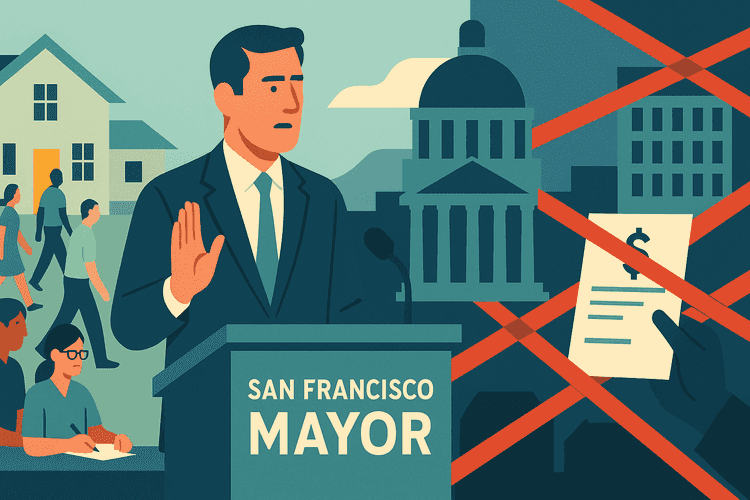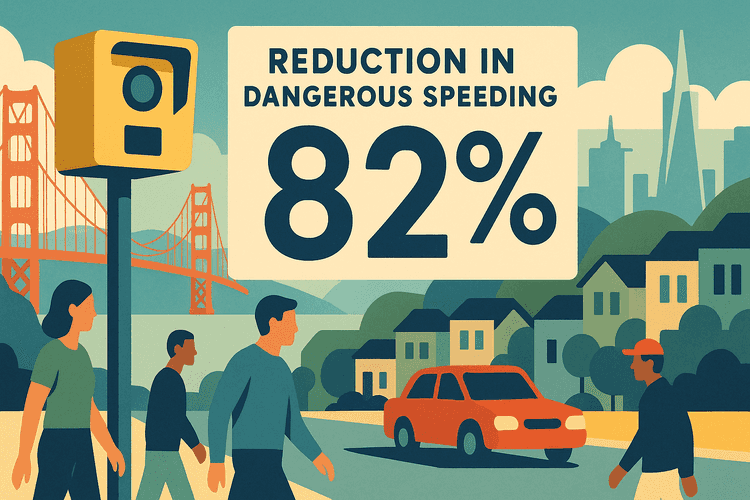Speed cameras reduce speeding by 82%
PLUS: Civic Leader Manny Yekutiel Files to Run in District 8
What You Need To Know
Here’s what happened around the city for the week of September 28, 2025:
- Governor Newsom vetos bill to expand sober housing
- Speed cameras reduce speeding by 82%
- SF Supervisor Proposes Doubling Sideshow Fines
- Pro-Growth Civic Leader Manny Yekutiel Files to Run in District 8
Your Action Plan:
- Support Danny Sauter’s legislation to make it easier to open a business in North Beach
Governor Newsom vetos bill to expand sober housing
Published October 3, 2025
The Facts
Governor Gavin Newsom vetoed AB255, a bill that would have allowed San Francisco and other cities to spend up to 10% of state homeless funding on sober housing for people in recovery, according to David Sjostedt at The Standard. The legislation, authored by Assemblymember Matt Haney and co-sponsored by Mayor Daniel Lurie, aimed to provide dedicated funding for “recovery-focused” housing that emphasizes abstinence from drugs and alcohol.
In his veto message, Newsom claimed existing state guidance already permits such housing within California’s Housing First framework, calling the bill “duplicative and costly.” Lurie slammed the veto, saying “We are starting to see progress, but the governor’s veto of this bill threatens to stop that progress in its tracks.”
The Context
The veto directly threatens San Francisco’s expanding sober housing initiatives under Lurie’s Breaking the Cycle program. The city opened its first abstinence-based homeless shelter last month and has several similar projects in development. The need for drug-free alternatives is stark: at least 166 people fatally overdosed in city-funded hotels in 2020 and 2021 alone, according to Chronicle data.
Supervisor Matt Dorsey called the veto “disappointing,” telling The Standard it has caused confusion: “I feel like this could’ve clarified the law, and now I feel like there’s less clarity than before.” Haney demanded Newsom clarify whether “recovery housing is fully allowed under current law,” warning that without guidance, the state will leave “housing providers paralyzed” and “people in recovery without the homes they need.”
The GrowSF Take
This veto exemplifies how state bureaucracy blocks effective local governance. Lurie has fundamentally transformed the city’s response to San Francisco’s overdose crisis. Yet Sacramento’s rigid adherence to Housing First ideology prevents cities from accessing funding for proven alternatives.
Newsom’s claim that existing law already permits sober housing funding only makes the veto more frustrating—if that’s true, why not clarify it through legislation rather than force cities to navigate bureaucratic ambiguity? This is government dysfunction at its worst: preventing local leaders from implementing solutions that save lives because of process disputes and ideological rigidity.
Speed cameras reduce speeding by 82%
Published October 2, 2025
The Facts
San Francisco’s new speed cameras are proving highly effective, cutting the number of vehicles speeding by more than 10 mph by an average of 82% across monitored intersections. According to reporting from Garrett Leahy at The Standard and Danielle Echeverria at The Chronicle, the 56 cameras began issuing citations on August 5 and generated over 16,500 tickets in their first month. The impact is stark: at Geneva Avenue, speeding dropped from 31% of drivers to just 3%, while at Alemany Boulevard, violations fell from 26% to 5%, per SFMTA data. The data also shows the deterrent is working, with two-thirds of drivers not repeating the offense.
The Context
The cameras represent San Francisco’s first major automated traffic enforcement expansion since Vision Zero’s launch in 2014. The city’s safety record has been dismal—2024 was the deadliest year for dangerous driving since 2007 with 42 deaths, while SFPD traffic enforcement collapsed by 95% between 2014 and 2022. The program was enabled by state law AB 645, which allows six California cities to pilot automated speed enforcement. San Francisco was the first to implement the technology, while Oakland, San Jose, and Los Angeles lag behind with deployments not expected until late 2025 or 2026.
The GrowSF Take
The stunning success of the speed camera program proves that technology and data-driven enforcement are the keys to making our streets safer. While SFPD abandoned traffic enforcement, these cameras are delivering the accountability and deterrence that years of manual policing failed to provide.
The 82% reduction in dangerous speeding shows that modern tools can solve longstanding problems when they are implemented systematically. Rather than accepting dangerous driving as inevitable, San Francisco used technology to create immediate, measurable safety improvements. This data-driven approach—not endless committees or process reforms—is how the city should tackle every public safety challenge.
SF Supervisor Proposes Doubling Sideshow Fines
Published October 1, 2025
The Facts
Supervisor Danny Sauter introduced an ordinance Tuesday to double the maximum fine for misdemeanor sideshow offenses from $500 to $1,000, aligning San Francisco with state law and penalties in nearby cities including Oakland, Antioch, and Santa Rosa. Mayor Daniel Lurie expressed support for the legislation, saying it will “send a message that this type of behavior is unacceptable in San Francisco,” while Interim Police Chief Paul Yep said “increasing penalties will assist our officers against this dangerous activity.”
The Context
The proposal follows intensified enforcement efforts targeting illegal dirt bike activity. On September 21, SFPD seized six dirt bikes and one ATV during a coordinated operation involving the Citywide Plainclothes Team, Real-Time Investigation Center, drones, and the Stunt Driving Response Unit, according to the District Attorney’s Office. Two San Francisco men, Nino Fiopoto (28) and Rubin Mesa (30), were charged with reckless driving and participating in a speed contest after being arrested near Divisadero Street and Lombard Street. The operation used automated license plate readers, drones, and surveillance cameras to assist ground officers.
The GrowSF Take
This demonstrates exactly how effective governance should work: police deploy modern technology to enforce existing laws, prosecutors charge offenders, and legislators respond with stronger deterrents. Doubling fines to match neighboring jurisdictions eliminates San Francisco as a soft target while giving law enforcement better tools.
Pro-Growth Civic Leader Manny Yekutiel Files to Run in District 8
Published September 30, 2025
The Facts
Manny Yekutiel, owner of the prominent civic space Manny’s on Valencia Street, announced his candidacy for District 8 supervisor in an exclusive interview with The Standard. The 36-year-old entrepreneur has secured impressive endorsements including current District 8 Supervisor Rafael Mandelman, former supervisors Bevan Dufty, and former mayors Willie Brown and Art Agnos.
Yekutiel positions himself as the “builder supervisor” focused on “more housing, more businesses, more ideas, more events,” telling The Standard: “For too long, we thought of the government as an entity that can stop things.”
The Context
Yekutiel has built remarkable civic influence since opening Manny’s in 2018, creating one of the West Coast’s most important liberal gathering spaces. His political connections run deep—he co-founded the Civic Joy Fund with now-Mayor Daniel Lurie, organizing Downtown First Thursdays and night markets that attract up to 25,000 attendees. Mayor London Breed appointed him to the Municipal Transportation Agency board in January 2021.
He’ll face Gary McCoy, Speaker Emerita Nancy Pelosi’s California political director who has announced his own campaign.
The GrowSF Take
District 8 voters will need a supervisor who prioritizes housing production, small business support, clean and safe streets, and real solutions to our drug problem. Yekutiel’s vision of government as an enabler rather than an obstacle, combined with his track record of turning civic ideas into reality is compelling.
The November 2026 election is still over a year away. Stay tuned for more coverage as the race develops and we learn more about each candidate’s policy positions and unique qualifications.
Love the GrowSF Report? Share it
Help GrowSF grow! Share our newsletter with your friends. The bigger we are, the better San Francisco will be.
Your Action Plan
Now that you know what’s happening, help us shape what happens next:
Support Danny Sauter’s legislation to make it easier to open a business in North Beach
Supervisor Sauter has introduced legislation to cut red tape in North Beach so local businesses can expand without endless hearings and outdated zoning rules. The reforms would streamline approvals, reduce vacant storefronts, and make it easier for small businesses to thrive.
But Supervisor Aaron Peskin is fighting these changes to keep his grip on neighborhood politics. The legislation heads to the Land Use Committee on Monday — email the committee today and urge them to support reform.






